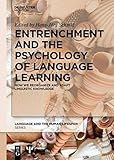Entrenchment and the psychology of language learning : how we reorganize and adapt linguistic knowledge / edited by Hans-Jörg Schmid, Department of English and American Studies, Ludwig-Maximilians-Universitat Munchen.
Material type: TextSeries: Publication details: Washington, DC : American Psychological Association ; (c)2017.; Boston : De Gruyter Mouton, (c)2017.Edition: First editionDescription: 1 online resource (viii, 475 pages)Content type:
TextSeries: Publication details: Washington, DC : American Psychological Association ; (c)2017.; Boston : De Gruyter Mouton, (c)2017.Edition: First editionDescription: 1 online resource (viii, 475 pages)Content type: - text
- computer
- online resource
- 9783110341423
- 3110341425
- 9783110341430
- 3110341433
- 9783110634891
- 3110634899
- P53 .E587 2017
- COPYRIGHT NOT covered - Click this link to request copyright permission: https://lib.ciu.edu/copyright-request-form
| Item type | Current library | Collection | Call number | URL | Status | Date due | Barcode | |
|---|---|---|---|---|---|---|---|---|
 Online Book (LOGIN USING YOUR MY CIU LOGIN AND PASSWORD)
Online Book (LOGIN USING YOUR MY CIU LOGIN AND PASSWORD)
|
G. Allen Fleece Library ONLINE | Non-fiction | P53.7 (Browse shelf(Opens below)) | Link to resource | Available | ocn967235123 |
Browsing G. Allen Fleece Library shelves, Shelving location: ONLINE, Collection: Non-fiction Close shelf browser (Hides shelf browser)
Includes bibliographies and index.
I. Setting the scene -- II. Linguistic perspectives on entrenchment -- III. Cognitive foundations of linguistic entrenchment processes -- IV. Entrenchment in language learning and language attrition -- V. Deconstructing entrenchment -- VI. Synopsis.
"In recent years, linguists have increasingly turned to the cognitive sciences to broaden their investigation into the roots and development of language. With the advent of cognitive-linguistic, usage-based and complex-adaptive models of language, linguists today are utilizing approaches and insights from cognitive psychology, neuropsychology, social psychology and other related fields. A key result of this interdisciplinary approach is the concept of entrenchment --
COPYRIGHT NOT covered - Click this link to request copyright permission:
There are no comments on this title.







